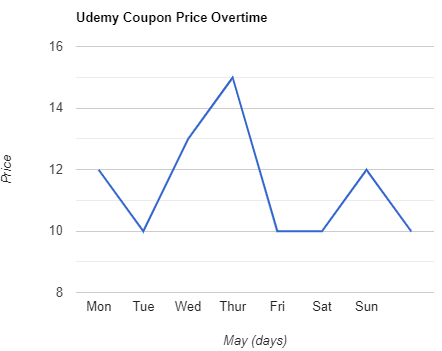Gutenberg Blocks for WordPress and React Developers (Udemy.com)
Use Your ReactJS and Redux Knowledge to Create Complex Gutenberg Blocks and Plugins from scratch.
Created by: Ali Alaa
Produced in 2022
 What you will learn
What you will learn
- Learn about Gutenberg blocks design guidelines.
- Discover how Gutenberg saves your post in the database and how the editor UI is constructed.
- Learn how to use webpack to transpile ES6 and JSX, compile SASS to CSS, bundle and minify your JS and CSS files and more.
- Integrating ESLint, Prettier and husky in your project to improve your workflow.
- Create a new custom Gutenberg block from scratch.
- Customize Gutenberg features in your WordPress theme.
- Discover every aspect you need to know to create a complex Gutenberg block.
- Create a nested block (a block that accepts other blocks inside of it).
- Use third party react libraries to create complex features.
- Learn about handling deprecated blocks.
- Learn how to transform your custom block into another block.
- Create a dynamic block.
- Explore how to use existing redux stores in your blocks.
- Learn how to create your own redux stores in order
 Quality Score
Quality Score
Content Quality
/
Video Quality
/
Qualified Instructor
/
Course Pace
/
Course Depth & Coverage
/
Overall Score : 92 / 100
 Live Chat with CourseDuck's Co-Founder for Help
Live Chat with CourseDuck's Co-Founder for Help
Need help deciding on a redux course? Or looking for more detail on Ali Alaa's Gutenberg Blocks for WordPress and React Developers? Feel free to chat below.
Join CourseDuck's Online Learning Discord Community
 Course Description
Course Description
Recently WordPress decided to change their old WYSIWYG editor into a new ReactJS based editor called 'Gutenberg'. Gutenberg also known as the block editor is based on blocks. So your post will be composed of some blocks and each block will have a purpose. You can have a block that displays a button or an image or some text and so on.
In this course you will learn everything you need to know in order to create custom blocks for Gutenberg. We will start by a simple block and then we will create some more complex blocks.
In order to gain the most out of this course you need to have WordPress theme/plugin development knowledge. Javascript knowledge is required for this course. You should be familiar with basic JavaScript concepts and preferably the recent ES6+ versions. ReactJS knowledge is also required for this course. So concepts like component state, lifecycle method and basic react concepts should not be new to you. Also advanced concepts like higher order component knowledge would be ideal however it will be discussed briefly in the course. Redux knowledge is also ideal. Not all blocks will require using redux, however in some blocks we will use redux heavily. So it would be ideal if you are familiar with redux concepts like stores, actions, reducers and so on.
The course content will go as follows:
Who this course is for:
In this course you will learn everything you need to know in order to create custom blocks for Gutenberg. We will start by a simple block and then we will create some more complex blocks.
In order to gain the most out of this course you need to have WordPress theme/plugin development knowledge. Javascript knowledge is required for this course. You should be familiar with basic JavaScript concepts and preferably the recent ES6+ versions. ReactJS knowledge is also required for this course. So concepts like component state, lifecycle method and basic react concepts should not be new to you. Also advanced concepts like higher order component knowledge would be ideal however it will be discussed briefly in the course. Redux knowledge is also ideal. Not all blocks will require using redux, however in some blocks we will use redux heavily. So it would be ideal if you are familiar with redux concepts like stores, actions, reducers and so on.
The course content will go as follows:
- First and before any coding we will discuss some design guidelines that you should follow when designing a block.
- We will take a look on how your Gutenberg post is saved in your database and what happens behind the scenes in order to construct your ReactJS based UI from the content saved in the database.
- In section 2, we will have a webpack tutorial. This section will not deal with any of the WordPress stuff. It will be purely webpack. webpack is the tool that we will use in order to transpile and bundle out Javascript and CSS files.
- In Section 3, we will create a WordPress plugin. Inside this plugin we will register out first Gutenberg block. We will also use out webpack knowledge in order to process JS and CSS files in this plugin.
- In section 3 we will also have some bonus content. In this content we will learn how to integrate ESLint, prettier and husky for an improved workflow.
- In section 4, we will take a quick look on some stuff that you can do in your WordPress theme that will allow you to modify/add some features in the Gutenberg editor.
- In section 5 we will create a simple block. However in this simple block we will learn a lot about what we can do in a block.
- In section 6 we will use our knowledge to create a more complex block with some advanced features. These features include how to add blocks inside of other blocks, how to handle images and many more.
- Section 7 will be about creating dynamic blocks. So blocks can be static or in other words only generate some static HTML. But also they can be dynamic for example they can fetch something from the database.
- Section 8 will discover more about redux in Gutenberg. We will see how to use the existing redux stores and also create our own store.
- Finally in section 9 we will see different ways that we can follow in order to manage metadata in Gutenberg. We will manage metadata using a block. And we will also learn how to create a custom sidebar plugin and manage metadata in this sidebar.
Who this course is for:
- WordPress theme/plugin developers who are familiar with ReactJS and want to create Gutenberg blocks from scratch.
- Anybody with some WordPress and ReactJS experience who wants to know everything about the Gutenberg editor.
 Instructor Details
Instructor Details

- 4.6 Rating
 20 Reviews
20 Reviews
Ali Alaa
Hey there! I am Ali Alaa, a front-end web developer. Years ago I discovered my interest in web development, especially the front-end side. I started exploring the field from HTML/CSS/JS to WordPress theming and JS frameworks. I have been working as a front-end developer for about 7 years. After all these years, I decided to start creating on udemy and share my knowledge with you.







